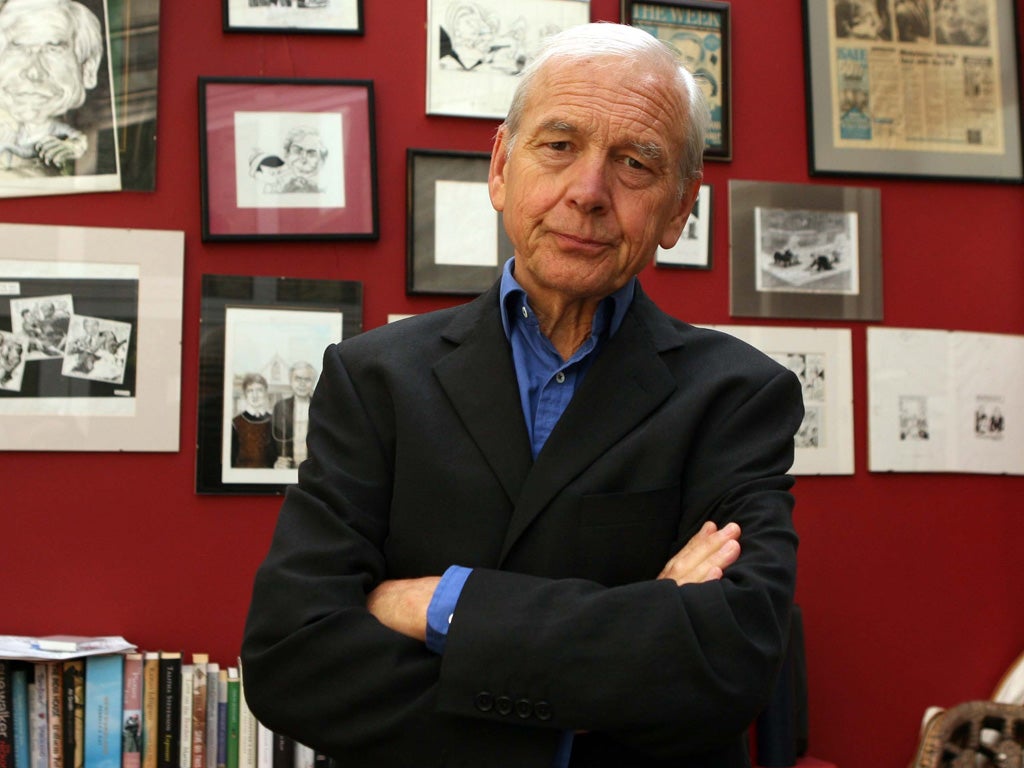The tragic story of a good man brought down by a basic lack of journalistic curiosity
Entwistle stunned Humphrys by revealing he 'was out' when Newsnight aired

Your support helps us to tell the story
From reproductive rights to climate change to Big Tech, The Independent is on the ground when the story is developing. Whether it's investigating the financials of Elon Musk's pro-Trump PAC or producing our latest documentary, 'The A Word', which shines a light on the American women fighting for reproductive rights, we know how important it is to parse out the facts from the messaging.
At such a critical moment in US history, we need reporters on the ground. Your donation allows us to keep sending journalists to speak to both sides of the story.
The Independent is trusted by Americans across the entire political spectrum. And unlike many other quality news outlets, we choose not to lock Americans out of our reporting and analysis with paywalls. We believe quality journalism should be available to everyone, paid for by those who can afford it.
Your support makes all the difference.If it was curiosity that killed the cat, then it was surely a lack of that most basic of journalistic instincts that did for George Entwistle, who will go down in BBC annals as the organisation's shortest-serving Director-General.
His reluctance to know the story, apparently preferring the information vacuum of an insulated management bubble, was astonishing to colleagues in BBC News. "You have no natural curiosity?" asked an incredulous John Humphrys on Saturday morning as he grilled Entwistle on his failure to spot the danger of Newsnight's flawed broadcast on child abuse in North Wales.
He then caused Humphrys even further astonishment by blithely adding that he "was out" when the timebomb of a programme went to air on 2 November. How could a former editor of that same flagship news brand be so uninterested in the news? Entwistle had shown a similar taste for ignorance over Newsnight's Jimmy Savile investigation, declining to ask Helen Boaden for more information after she warned him he could have a "scheduling problem" for the tribute programmes he was overseeing last year. Entwistle didn't want to be seen to be interfering.
Entwistle's arrival in the top job, just 54 days before his resignation speech on Saturday night, was almost universally seen as good thing. The former head of BBC Four and BBC Knowledge appeared to have the intellectual rigour to oversee the delivering of high-quality public-service programming. He had strong journalistic credentials and, as a programme-maker, the support of the staff. A nice guy, hardly anyone had a bad word to say about George.
He had wanted to run the BBC since childhood. At the age of six he wrote to the "Derector of the BBC" to complain about the scheduling of Tom and Jerry.
Entwistle, 50, was appointed with the difficult tasks of implementing serious budget cuts and planning for the negotiation of the BBC's licence fee beyond 2016. But he inherited an organisation in fine reputational fettle after its coverage of the London Olympics that was almost as well received as the performance of Team GB itself.
In his resignation speech, he spoke of his belief that he had been "the right person to tackle the challenges and opportunities ahead" but had been defeated by "wholly exceptional events".
Hours before Remembrance Sunday, he talked of doing the "honourable thing" in resigning, noting that as head of the BBC's editorial chain of command, he should take "ultimate responsibility" for a false story.
But unlike former Director-General Greg Dyke, who fell on his sword in 2004 over Radio 4's controversial report on Iraqi weapons of mass destruction, Entwistle should have had more than a nominal role in the story.
He didn't brief himself on the Newsnight Savile investigation despite his responsibility for tribute shows about the Jim'll Fix It presenter. The lack of insight prompted Private Eye to suggest that the bespectacled Director of Vision "should have gone to Specsavers". Neither did he read press reports last week about inaccuracies in Newsnight's North Wales story, because he was too busy working on a speech.
Time and again, he reminded Humphrys of the scale of his new role and how he couldn't be expected to know all that was going on in the BBC. Struggling to get up to speed with his wide-ranging responsibilities in the top job, he could not cope with a journalistic crisis.
"It's a real tragedy that he was overwhelmed, as we all were to a great extent, by these events before he was able to act in a way which is clearly necessary," said Lord Patten. Losing such a valuable servant is a great loss to the BBC. He had promised to deliver "more Shakespeare" and more coverage of women's sport. Now such things will be a matter for his successor.
Join our commenting forum
Join thought-provoking conversations, follow other Independent readers and see their replies
Comments